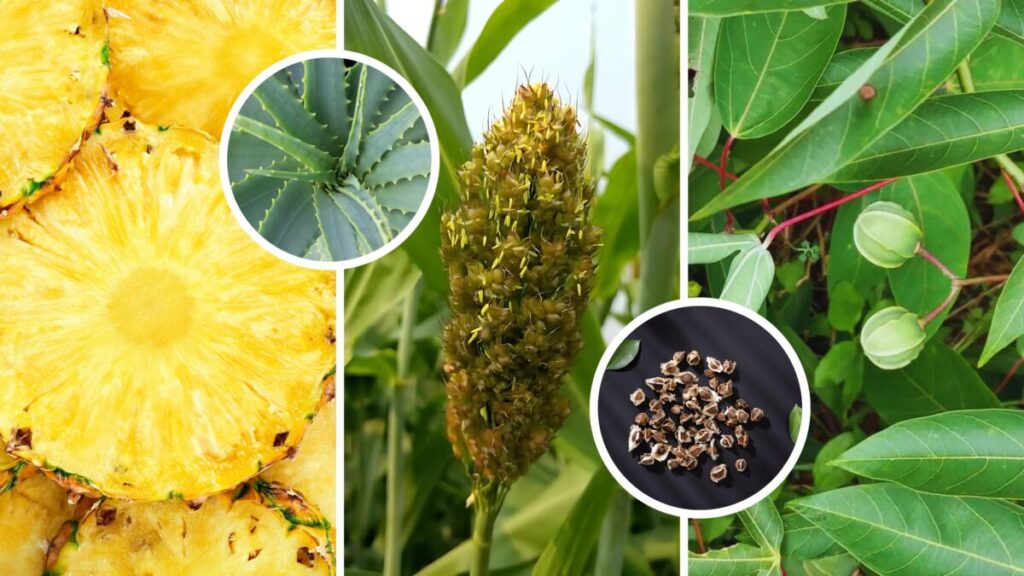Tropical plants that grow seeds often surprise gardeners because many of them are propagated through cuttings, stems, or offsets for convenience. However, under the right conditions, some tropical plants produce seeds, which play a vital role in ensuring natural reproduction and maintaining genetic diversity. In this article, we’ll explore seven tropical plants that grow seeds, how long they take to flower, and what conditions are required for successful seed development.
1. Bitterleaf: A Surprising Seed Producer
When it comes to tropical plants that grow seeds, bitterleaf is an unexpected example. While this plant is widely propagated through cuttings for its quick growth, it also has the ability to flower and produce seeds, which many gardeners may overlook.
- Time to Flower/Seed Production: Bitterleaf typically flowers and produces seeds within 6–8 months of planting.
- Conditions Required: For bitterleaf to grow seeds, it must be left to mature in loamy, well-drained soil with abundant sunlight and consistent watering. However, if the plant is harvested for its leaves too early, it won’t have the chance to develop seeds. Once matured, the seeds thrive in warm, humid conditions, making them easy to germinate.
2. Plantain: A Tropical Favorite That Grows Seeds
Another excellent example of tropical plants that grow seeds is the plantain. Most gardeners grow plantains through suckers because it is a fast and efficient method. Yet, wild varieties of plantains naturally produce seeds, which are found within their mature fruit.
- Time to Flower/Seed Production: Plantains take approximately 18–24 months to flower and bear seeds.
- Conditions Required: For plantains to develop seeds, they need rich, well-drained soil, regular watering, and warm tropical temperatures. Unfortunately, harvesting the plant prematurely for its fruit disrupts seed formation. When left to mature fully, the seeds germinate well in moist, warm soil.
3. Moringa: The Miracle Tree with Seeds
Among tropical plants that grow seeds, moringa is often a standout. Known as the “miracle tree,” it offers remarkable versatility. Although it is commonly propagated from cuttings for speed, moringa also produces seeds that are valuable for planting, oil extraction, and even water purification.
- Time to Flower/Seed Production: Moringa begins flowering and producing seeds within 6–8 months.
- Conditions Required: Moringa thrives in sandy or loamy soil with excellent drainage and full sunlight. To ensure seed production, you must allow the tree to flower completely; harvesting its branches or leaves too early prevents this. Furthermore, the seeds are easy to germinate in well-drained soil, making them accessible for gardeners.
4. Sugarcane: Sweet Stalks That Produce Seeds
Although sugarcane is primarily grown through stem cuttings, it is another tropical plant that grows seeds when the right environmental factors are met. This capability is often underappreciated, as seed production in sugarcane is less common in commercial farming.
- Time to Flower/Seed Production: Sugarcane flowers and produces seeds after 10–14 months.
- Conditions Required: To develop seeds, sugarcane requires long daylight hours, nitrogen-rich soil, and warm temperatures. However, harvesting the plant early for its stalks prevents flowering and, consequently, seed formation. When allowed to flower, sugarcane seeds germinate effectively in warm, humid conditions.
5. Cassava: A Tropical Staple That Produces Seeds
Cassava is a staple food crop in tropical regions and is usually propagated through cuttings. Nevertheless, this plant is capable of growing seeds, especially when exposed to specific environmental stressors like drought.
- Time to Flower/Seed Production: Cassava produces flowers and seeds within 8–12 months of planting.
- Conditions Required: Cassava thrives in sandy or loamy soils. While it flowers under stress conditions such as drought, harvesting the plant too early for its roots halts seed formation. The seeds, when mature, germinate easily in warm, dry soil, making them another viable propagation option.
6. Aloe Vera: A Slow Yet Reliable Seed Grower
Aloe vera is well-known for its medicinal properties, but many gardeners are unaware it can grow seeds. This tropical plant, often propagated through offsets, produces seeds only when allowed to flower and mature.
- Time to Flower/Seed Production: Aloe vera flowers and produces seeds after 3–4 years of growth.
- Conditions Required: For aloe vera to flower and grow seeds, it must be planted in sandy, well-drained soil and exposed to full sunlight. However, if harvested prematurely for its gel, the plant will not develop seeds. Patience is essential when growing aloe vera for seeds, as the process is slower compared to vegetative propagation.
7. Pineapple: A Sweet Fruit with Hidden Seeds
Pineapples are often grown by planting their crowns, but they are another tropical plant that grows seeds when left to flower and fully mature. This surprising ability adds another layer of versatility to this popular fruit.
- Time to Flower/Seed Production: Pineapples take about 18–24 months to flower and grow seeds.
- Conditions Required: Pineapples require acidic, well-drained soil and warm tropical temperatures to flower and produce seeds. If harvested too early, seeds will not develop. Once matured, pineapple seeds germinate slowly in moist soil, offering a rewarding experience for patient gardeners.
Why Seeds Matter in Tropical Plants
Although propagation by cuttings or suckers is faster, seeds provide unique benefits. They promote genetic diversity, enable natural reproduction, and allow plants to adapt to changing environments. By letting tropical plants grow seeds, gardeners can foster biodiversity while deepening their connection to the plant lifecycle.
For those with a green thumb or an interest in home gardening, don’t miss my book, Home Gardening in Diaspora: A Guide to Growing Organic Food in Your Home. This comprehensive guide is packed with practical tips and strategies to help you grow a thriving garden, no matter where you are. From beginners to seasoned gardeners, this book is an invaluable resource for cultivating your own fresh, organic ingredients to take your cooking to the next level.
Visit our website www.esteelicious.com today to explore our recipes and discover how Home Gardening in Diaspora can transform your gardening and cooking journey.

